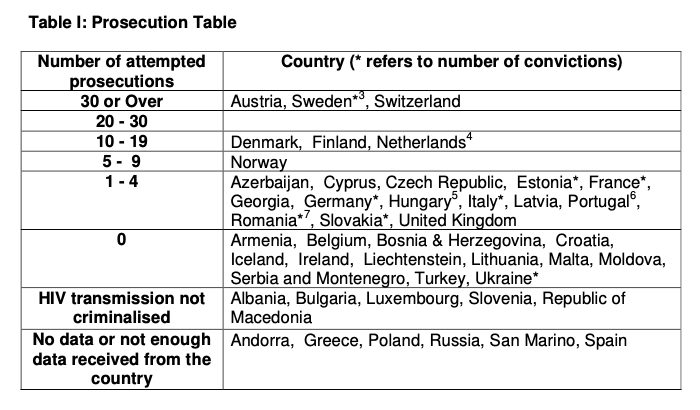Brief report from clinical practice in Tanzania which found no HIV transmission from mothers who were retained in care and had suppressed viral load whilst breastfeeding. They conclude: “Breastfeeding signifies a very low risk when mothers adhere to ART.”
HIV, the Law and Human Rights in the African Human Rights System: Key Challenges and Opportunities for Rights-Based Responses
Report on the Study of the African Commission on Human and Peoples’ Rights. The report presents the current state of the HIV epidemic in Africa through a human rights and gender lens by showing the populations and locations most affected by HIV and those underserved by the response to the epidemic. It also describes the global, regional and national norms and standards relating to HIV and health, as well as their interpretation and application by African regional mechanisms, United Nations (UN) bodies and national courts and institutions. It further provides a detailed analysis of the key human rights challenges affecting the response to HIV on the continent.
Malawi MPs use SADC Model Law on HIV to fight bad parts of HIV Bill
After nearly 10 years of intense debate and consultations, Malawi Members of Parliament voted to reject controversial provisions in their HIV (Prevention and Management) Bill. The Bill had included provisions that would have made HIV testing and treatment mandatory for specific people in a discriminating manner. Additionally, and perhaps more controversially, the Bill had sought, also, to allow criminalisation of HIV transmission, exposure and non-disclosure. This newsletter captures part of the debates leading to the passing of the final Bill.
Understanding Criminal Prosecutions for Sexual Transmission of Infection
A report on charges of grievous bodily harm via sexual transmission of infection handled by the Crown Prosecution Service in England and Wales between 2008-2012, their management and outcomes.
Evaluation of the Global Commission on HIV and the Law
Findings from an external evaluation of the impacts and legacy of the Global Commission on HIV and the Law. It explores the fulfilment of the Commission’s objectives, taking into account the perspectives and experiences of representatives from government, including law and policy makers, civil society including those most marginalised and affected by HIV, as well as United Nations agencies and other development partners.
Evidence for eliminating HIV-related stigma and discrimination – Guidance for countries to implement effective programmes to eliminate HIV-related stigma and discrimination in six settings
This report reviews the latest evidence on what works to reduce HIV-related stigma and discrimination through key programmes to reduce stigma and discrimination and increase access to justice in the six settings of focus for the Global Partnership, including Justice. It includes guidance and recommendations for national governments and key stakeholders to implement programmes to empower populations “being left behind”; remove laws criminalising drug use or possession for personal use, all aspects of sex work, sexual orientation, gender identity, and HIV exposure, non-disclosure and transmission and to routinely review existing laws, regulations and policies relating to HIV.
GNP+ and THT. Criminalisation of HIV transmission in Europe: A rapid scan (2005)
This paper, prepared by Moono Nyambe at GNP+, and managed by Julian Hows (GNP+) and Lisa Power (Terrence Higgins Trust) comprised a synthesis of input from several different sources, pubished in April 2005 as a draft document open to comments. The statements and information provided in this document are based on replies to a questionnaire and have not been independently confirmed. The views expressed in this document do not necessarily reflect the official position of UNAIDS which partly funded its production.
Respondents from 41 out of 45 countries provided information for the study. Of the respondents from the 41 countries that were able to provide information, it was reported that in at least 36 countries the actual or potential transmission of HIV can constitute a criminal offence. This supported anecdotal evidence that increasingly the law is seen as a tool for regulating conduct that can lead to HIV transmission. In 21 of these countries, it was reported that at least one person has been prosecuted.

Beyond Criminalization: A Feminist Questioning of Criminal Justice Interventions to Address Sexual and Reproductive Rights Violations
The report presents the findings of the desktop research lead by the global south feminist alliance RESURJ, (Realizing Sexual and Reproductive Justice), as part of the alliance’s leadership work on the shortcomings and limitations of penal policies in addressing sexual and reproductive rights violations. The aim of the review and this analytical report is to strengthen RESURJ’s evidence base on sexual and reproductive justice and to further engage with diverse feminists and groups to reimagine alternatives to criminalized approaches, alternatives that put human rights and justice at the center.
The Criminalization of HIV Non-Disclosure – Experiences of people living with HIV In Canada
This is the first known qualitative research study in Canada examining the phenomena of criminal and public health charges for HIV non-disclosure from the perspectives of those who have lived it.
The project examined the experiences of people living with HIV who were charged, prosecuted, or threatened with criminal and public health charges in Canada because they had been alleged to not tell sex partners of their HIV-positive status. The project was conducted between January 2016 to January 2019.
Advancing HIV Justice 3: Growing the global movement against HIV criminalisation
Provides a progress report of achievements and challenges in global advocacy against HIV criminalisation from 1st October 2015 to 31st December 2018.